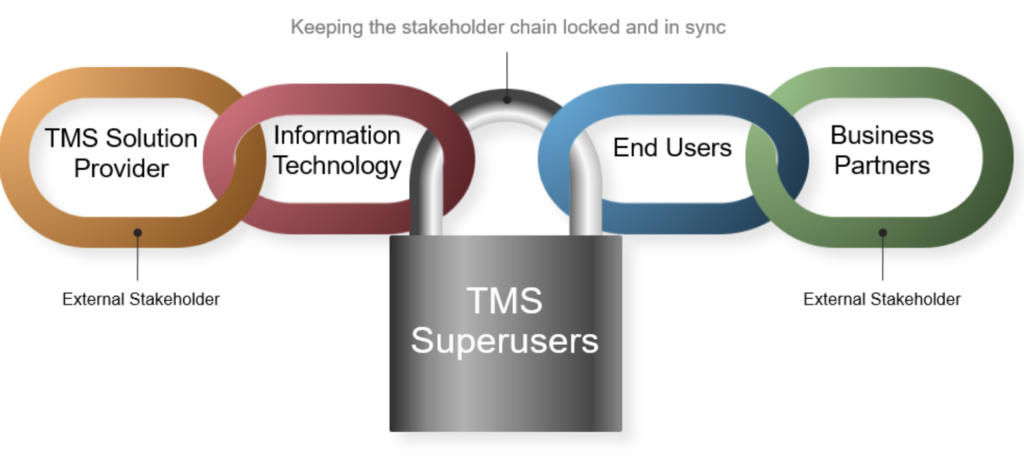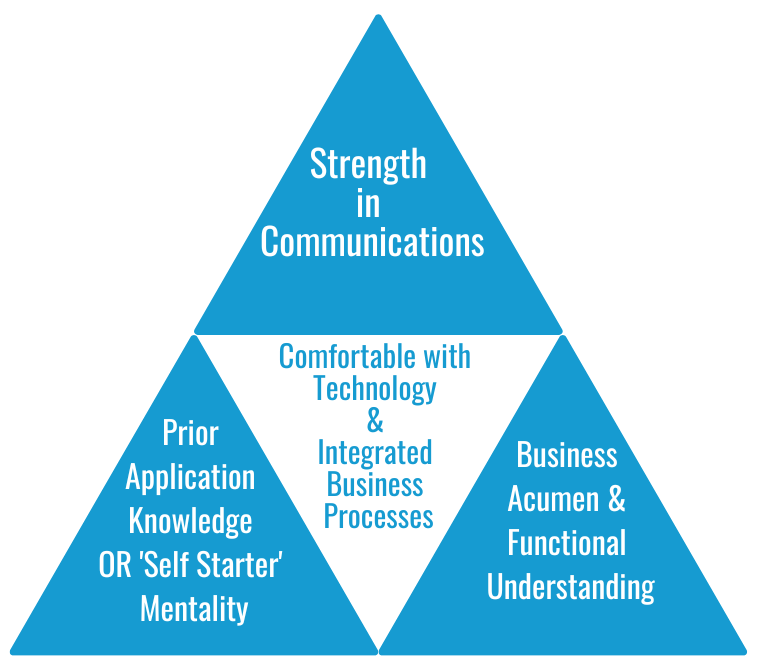Early morning hypercare meetings. Late hours updating parameters. Answering a never-ending stream of questions. These are all part of the gig when it comes to being a Superuser.
Receiving kudos from End Users and watching sites go live are some of the rewarding moments. When you are acknowledged by key stakeholders as being pivotal to a rollout, there’s nothing like it.
For the chosen few that get to play this role, it’s worth every minute of it. These are the unsung heroes of the TMS world.
What is a Superuser?
A Superuser for a TMS system is a person or group of people who maintain the system and enable the End Users to do their job. They usually work for the company who owns the TMS, such as a shipper or third-party logistics company.
Superusers should know a higher level of detail with regards to configuring the TMS and, depending on security constraints, they may be the only ones who have the ability to configure and test certain elements of the TMS.
End Users rely on Superusers to help with any issues that arise.
The Superuser team often bridges the gap between the business/end users and Information Technology (IT). Superusers also interact with external stakeholders such as the TMS Solution provider or Business partners such as Carriers and Suppliers/Vendors.
Some key responsibilities of Superusers include:
- Capturing business requirements and translating into actionable system configuration changes or additions
- Configuring base data for business objects like locations, carriers, tariffs, and rates
- Training end users
- Developing new business processes
- Providing first line support to End Users
- Adding pertinent data to support new logistics flows
During the rollout of a TMS, the Superusers are not only configuring the system, but they are also becoming proficient in the solution itself.
Many times, Superusers are found internally within the business, and they may or may not have exposure to the TMS. If they do not know the TMS being implemented, the rollout is also a training ground for Superusers to learn the system, often working alongside solution experts.
After becoming proficient with the TMS, the “training wheels” come off and Superusers are relied upon to help End Users with daily issues.
"While all TMS solutions have their own unique challenges, if the Superusers are excited, it will show—and End Users will follow their lead."
What makes a good Superuser?
While choosing the right TMS is critical, having a good Superuser team is just as important to make decisions regarding how to configure the system to handle business requirements.
With many TMS solutions there could be more than one way to approach a business problem. The Superusers need to understand multiple solution paths and be comfortable supporting whichever path they choose.
Decision-making and problem-solving skills are just a couple of the key attributes of a good Superuser.
Some other desirable traits include:
- Customer service oriented:
The Superusers need to take delight in helping End Users, rather than looking at helping people as just a job. If the Superuser is happy to help, it will reflect well to their customers, the End Users. Whenever an End User asks for help, the Superuser needs to jump into action because usually the issue is impeding the End User from conducting normal business operations. - Evangelistic attitude:
The Superusers are the cheerleaders of the TMS. They need to show a positive attitude and be excited about the TMS so that End Users are happy to use the solution. Without a positive attitude, End User adoption can erode and lead to disgruntled users. While all TMS solutions have their own unique challenges, if the Superusers are excited, it will show—and End Users will follow their lead. - Continual desire to learn/curiosity:
It takes time to master a TMS, and even when you think you know everything, there is always more to learn. Superusers need to constantly learn about parts of the system they do not already know about, and they also need to keep up to date with any new releases and features. - Team oriented:
Working as a Superuser team and collaborating with End Users and other partners in the business requires the ability to work well in a team environment. Team success is more important than individual achievements, and this culture is paramount within the Superuser group. - Transportation foundational knowledge:
Knowing how transportation works within the organization is a pre-requisite. A Superuser doesn’t need to know all the details, but in general they need to understand the transportation modes use, if intermediate points such as consolidation or deconsolidation points are used, if continuous moves are in play, how rate contracts are constructed, and more.
It is hard enough to train a Superuser to be an expert in the system but knowing the core business needs and transportation is a must.
"Superusers are the system experts and take a leadership role in their organizations."
How the Superusers can be your Superheroes
While they may not wear flashy outfits or work for a secret agency, the Superusers can be the Superheroes of your TMS.
There are times when it is tough being a Superuser, and I can say this from experience because I have been on 5 o’clock am hypercare calls and wrapped up the day updating the system at 9 o’clock pm at night.
For organizations with a TMS, you need great people to be stewards or care takers of the system. Superusers are the system experts and take a leadership role in their organizations. It requires personal sacrifice, but Superusers should take pride knowing they are keeping the system running smoothly.
End Users and the business appreciate the effort, and it does not go unnoticed.
JBF has both defined and played the Superuser role for multiple clients—we understand how it can make a company's transportation team more efficient, versatile, and resilient.
If you are embarking on a TMS journey, we can help point your Superuser team in the right direction to ensure success!
Meet the Author
Brian Lewis is a Client Engagement Director at JBF Consulting. Brian has over 25 years of extensive experience in Transportation and Logistics. Brian has helped organizations with multiple processes such as procurement, trading partner collaboration, transportation planning/optimization, visibility, settlement and billing, and reporting and analytics. His experience spans across multiple verticals including Retail, CPG, High Tech, 3rd Party Logistics, Food/Beverage, Government, and more. He has delivered both domestic and international projects. Brian earned his BS in Business Logistics with a minor in Management Information Systems from Penn State University. Brian is a certified SAFe Practitioner.
About JBF Consulting
Since 2003, we’ve been helping shippers of all sizes and across many industries select, implement and squeeze as much value as possible out of their logistics systems. We speak your language — not consultant-speak – and we get to know you. Our leadership team has over 70 years of logistics and TMS implementation experience. Because we operate in a niche — we’re not all things to all people — our team members have a very specialized skill set: logistics operations experience + transportation technology + communication and problem-solving skills + a bunch of other cool stuff.
🔹 🔹 🔹 🔹 🔹 🔹
Subscribe to the The Digital Logistician
Sign up for our Monthly Email Bulletin
Follow the JBF Company page on LinkedIn
Download our white papers & ebooks
RELATED POSTS
For more on Superusers, feel free to check out Can a TMS Virtual Superuser be Your Super Hero?
ADDITIONAL RESOURCES
Best Practices Through Expert Partners
Leadership in a New TMS Environment
Buyers Guide to Transportation Management Systems (white paper)




